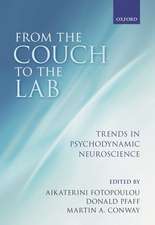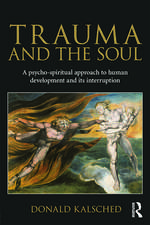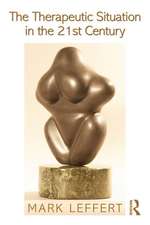Dreams, Neuroscience, and Psychoanalysis: Mind, Body, and the Question of Time
Autor Keramat Movallalien Limba Engleză Paperback – 7 feb 2017
The author begins by giving a historical view of fundamental questions such as the nature of the living being according to discoveries in ethology as well as in other research, especially that which is based on the theory of the reflex. It becomes clear in the process that these findings are consistent with the question of time as it has been considered in some major contemporary philosophies. This is then extended to the domain of dreams and sleep, as phenomena that are said to be elucidated by the question of time.
The question is then raised: can dreaming be considered as a drive? Based on the Freudian discovery of the unconscious and Lacan’s teachings, Movallali seeks to provide a better understanding of the drives in general and dreams in particular. He explores neuroscience in terms of its development as well as its discoveries in the function of dreaming as an altered mode of consciousness. The challenge of confronting psychoanalysis with neuroscience forces us to go beyond their division and opposition. Psychoanalysis cannot overlook what has now become a worldwide scientific approach. Neuroscience, just like the cognitive sciences, will be further advanced by acknowledging the desiring dimension of humanity, which is at the very heart of its being as essentially related to the question of time. It is precisely this dimension that is at the core of psychoanalytic practice.
Dreams, Neuroscience, and Psychoanalysis will appeal to psychoanalysts and psychoanalytic psychotherapists as well as neuroscientists, psychologists, ethologists, philosophers and advanced students studying across these fields.
| Toate formatele și edițiile | Preț | Express |
|---|---|---|
| Paperback (1) | 328.64 lei 6-8 săpt. | |
| Taylor & Francis – 7 feb 2017 | 328.64 lei 6-8 săpt. | |
| Hardback (1) | 1084.08 lei 6-8 săpt. | |
| Taylor & Francis – 7 feb 2017 | 1084.08 lei 6-8 săpt. |
Preț: 328.64 lei
Preț vechi: 400.18 lei
-18% Nou
Puncte Express: 493
Preț estimativ în valută:
62.90€ • 66.35$ • 52.42£
62.90€ • 66.35$ • 52.42£
Carte tipărită la comandă
Livrare economică 02-16 ianuarie 25
Preluare comenzi: 021 569.72.76
Specificații
ISBN-13: 9781138858251
ISBN-10: 1138858250
Pagini: 218
Ilustrații: 10
Dimensiuni: 156 x 234 x 18 mm
Greutate: 0.29 kg
Ediția:1
Editura: Taylor & Francis
Colecția Routledge
Locul publicării:Oxford, United Kingdom
ISBN-10: 1138858250
Pagini: 218
Ilustrații: 10
Dimensiuni: 156 x 234 x 18 mm
Greutate: 0.29 kg
Ediția:1
Editura: Taylor & Francis
Colecția Routledge
Locul publicării:Oxford, United Kingdom
Public țintă
Postgraduate and ProfessionalCuprins
Preface
PART ONE: BODY/MIND
CHAPTER ONE: What is the living?
CHAPTER TWO: The objects of cognitive neuroscience
CHAPTER THREE: Body/mind relations
CHAPTER FOUR: Questioning temporality
CHAPTER FIVE: The temporality and physiology of movement
PART TWO: DREAMING AND SLEEP
CHAPTER SIX: The oneiric process
CHAPTER SEVEN: Dreams and the neurophysiology of sleep
CHAPTER EIGHT: Dreaming, an intimate characteristic of the mind
CHAPTER NINE: Oneiric representation, drive, and its obverse
PART ONE: BODY/MIND
CHAPTER ONE: What is the living?
CHAPTER TWO: The objects of cognitive neuroscience
CHAPTER THREE: Body/mind relations
CHAPTER FOUR: Questioning temporality
CHAPTER FIVE: The temporality and physiology of movement
PART TWO: DREAMING AND SLEEP
CHAPTER SIX: The oneiric process
CHAPTER SEVEN: Dreams and the neurophysiology of sleep
CHAPTER EIGHT: Dreaming, an intimate characteristic of the mind
CHAPTER NINE: Oneiric representation, drive, and its obverse
Notă biografică
Kéramat Movallali is a psychoanalyst treating adults in private practice in Paris, France. He also conducts psychoanalytic treatments for children and adolescents in public institutions.
Descriere
Dreams, Neuroscience, and Psychoanalysis sets out to give a scientific consistency to the question of time and find out how time determines brain functioning. Neurological investigations into dreams and sleep since the mid-20th century have challenged our scientific conception of living beings. On this basis, Kéramat Movallali reviews the foundations of modern neurophysiology in the light of other trends in this field that have been neglected by the cognitive sciences, trends that seem to be increasingly confirmed by recent research.
























